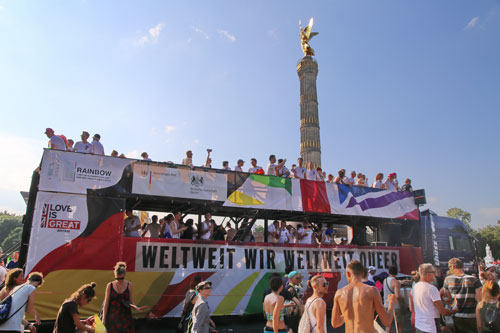We in the UK and Germany have come a long way over the past decades in the fight for tolerance, diversity and sexual equality. And we have achieved a great deal. Today it almost easy to forget that homosexual relations were illegal less than 50 years ago in both countries. Since then, many small steps have been taken, from illegality towards full equality in the eyes of the law.
However, even in as socially liberal and progressive countries as the UK and Germany, it took until 2013 and 2017 respectively to achieve the latest milestone, i.e. full marriage equality for same-sex couples. Other important successes include the pardoning of homosexual victims of historical persecution, as well as efforts to adjust bureaucratic processes to meet the needs of those people who do not ascribe to traditional gender models.
Our joint British Embassy and Auswärtiges Amt float at the Christopher Street Day parade in Berlin was our way of celebrating these achievements. We were also celebrating our shared values, our commitment to human rights, as well as our deep friendship. The Berlin CSD was a colourful festival of diversity, respect and tolerance.
There is no room for complacency, however. Legal equality for gay men and women may have been achieved with “marriage equality“, but there remains much to do in the fight against discrimination and marginalisation. LGBTI people in the UK and Germany continue to experience exclusion and hatred in their daily lives, sometimes even violence, either at school, at work or within their own family. Gay couples are often subjected to verbal or physical abuse, even on the streets of liberal and cosmopolitan capitals such as Berlin and London.
In 2017, 5% of LGBTI respondents in a British survey admitted to having been recommended so-called “conversion therapy“ by family members, faith communities or health organisations. 2% actually underwent such therapy. Prime Minister Theresa May has since announced plans for a ban on conversion therapy. In Germany and at a European level, too, there is finally talk of a ban.
Public opinion has changed a great deal in the past decades. Public opinion on occasion has even been several steps ahead of the politicians. A majority of Germans, for instance, favoured marriage equality long before there was a political majority in favour. There is a long way to go before we can consider attitudes to have normalised, however. Around 40% of Germans still say they feel uncomfortable if they see two men kissing in public. No wonder, therefore, that many lesbian and gay couples are reluctant to behave openly in public.
Our common goal is an open and tolerant society in which everyone – irrespective of their sexual orientation or identity – can live and love without fear. The successes of the past years are down, in particular, to the civilian activists who have demonstrated courage, perseverance and creativity in ensuring that human rights apply to us all – regardless of who we are, where we come from or whom we love.
We are not only promoting LGBTI rights at home. We want to strengthen those rights worldwide, too. Our governments are therefore supporting a multitude of projects around the world. For instance, we are helping under-threat LGBTI activists in Russia and Indonesia. In Ukraine, the Balkans, the Baltics and in the Maghreb we promote initiatives and events to gain broader societal acceptance of diversity, respect and tolerance. One such initiative which promotes the protection of human rights for LGBTI communities is the Kaleidoscope Trust, whose chairman, former British Diplomat Sir Stephen Wall, accompanied us at CSD. We address the issue of LGBTI rights in public and behind closed doors and appeal to governments around the world to respect and protect LGBTI human rights.
Progress is being made here, too. Pride marches are now held with confidence in places where you would never have been allowed to fly a rainbow flag in the past. Those many gay men, lesbians, bisexuals, trans- and intersexuals worldwide, for whom it is not possible to take to the streets to demand their rights, were very much in our thoughts at the Berlin CSD. They deserve our solidarity.
The employees of the British Embassy Berlin, the Auswärtiges Amt, and we as British Ambassador and Minister of State for Europe are proud to have celebrated Christopher Street Day together. It was important to fly the flag for diversity, respect and tolerance. And you can be sure we will team up again in the future – there is still much to do.

